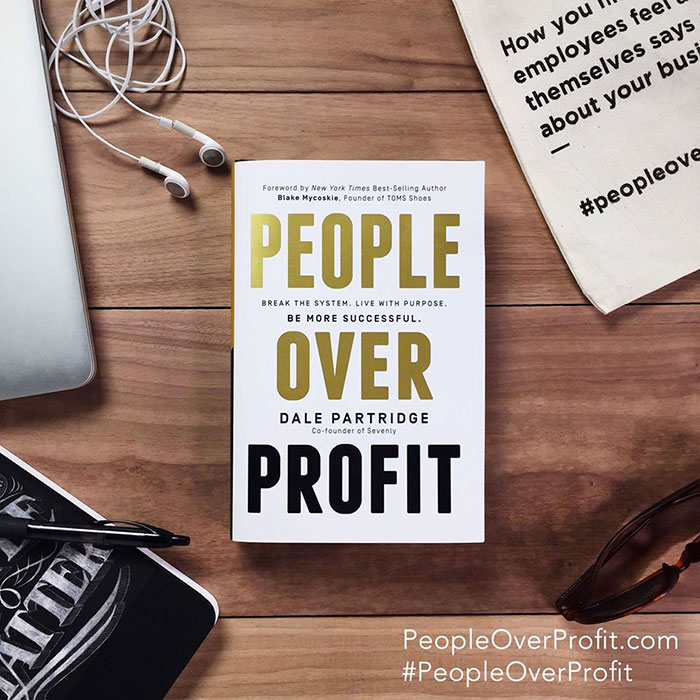Buffer has been committed to transparency and treating others right since their company began. They openly share revenue numbers (even though they’re a private company), staff salaries, and business advice through their blogs. Since then, they’ve reached annual recurring revenue of over $5.9 million dollars.
Sevenly is a socially conscious ecommerce company that makes awesome designed clothes. Each week they partner with a new nonprofit, and donate $7 of every sale to that nonprofit. Since they started, they’ve raised over $4.3 million dollars for nonprofit charities.
Clif Bar values their employees so much, that they provide their employees with a fitness center (that includes a climbing wall, yoga room, two massage rooms, and free access to five personal trainers and nutritionists); a $350 stipend for entering races and competitions and $1,000 per year for eco-conscious home improvements; the option to choose from several flexible work options (that fit their unique schedules); and a six- to eight-week sabbatical after seven years of service. In other words, Clif Bar employees get treated like family.
What do these three companies all have in common?
They all value people over profit.

These three companies all value people – their customers, employees, vendors, and people in general – above making a profit. Because of this, these companies attract top talent, have loyal and engaged employees, and a raving customer base. These companies value the people they do business with ahead of money, and because of this, their revenue and profit is consistently strong.
What does it mean to value people over profit? In his new book, People Over Profit, author and entrepreneur Dale Partridge highlights the 7 core beliefs of people-over-profit companies:
- People Matter. People are valuable; No person is worth more than another; Every person deserves to be treated fairly and with respect; Organizations should be empathetic to all people they touch.
- Truth Wins. These organizations tell the truth completely, quickly, and clearly. Because of this, customer’s trust these organizations more.
- Transparency Frees. Transparency removes speculation and builds greater trust – both internally and with customers.
- Authenticity Attracts. Authentic companies are true to who they are and don’t compromise on their values and core competencies. This helps them to innovate and maintain a competitive advantage in their market.
- Quality Speaks. Quality (in all areas) builds credibility and shows your customers how much you value them. Excellence in all areas of the business leads to greater customer loyalty and revenue.
- Generosity Returns. Generosity is a part of the DNA of these companies. They are generous in the way they operate and manage their money.
- Courage Sustains. A commitment to do what’s right and best for people, no matter how hard the decisions are (and regardless of fear).
A people-over-profit company must commit to all seven beliefs. By adopting the seven beliefs in your personal and professional life, you have the power to create a sustainable future where the marketplace is dominated by those who are committed to telling the truth, positively impacting the word, and valuing people. The net effect is that you’ll end up living with purpose, become even more successful, and achieve good that will outlive you.” – Dale Partridge
Here are some practical ways you could implement people-over-profit principles at your company:
- Start a company blog, and write a blog series on the different ways your employees are seeking personal development to improve their skills. Have each team member share their experiences, education, and lessons learned. This will allow customers to connect with your team in a more human way, creating more openness and trust.
- Give your employees one Friday off each month (paid time off), and cater lunch one day each week.
- Is there a quality element in your business that could be improved? Maybe your product, website design, logo, packaging, and/or storefront could be improved. Would customers benefit from this quality improvement? Could it attract/keep more customers, too?
- Have a 45-minute company meeting every other Friday, cater some good food and drinks, share some stats on the health of the company, read 1-2 customer testimonials/letters, and celebrate someone in the office by publicly by acknowledging something great he/she did (and reward them with a $25 Amazon gift card).
- Take one employee out to lunch each week, buy them lunch, and have a legit 45 minute conversation over a meal. Get to know your employees on a deeper level, and build affinity amongst your team.
Obviously, how you implement people-over-profit principles will depend on the size of your company, and not all companies will be able to do the above ideas. These ideas are just meant to stimulate your thinking, and get you brainstorming some possibilities.
If you’re an entrepreneur and/or in business, I highly recommend picking up a copy of Dale’s People Over Profit. It will cause you to reevaluate how you do and view business; treat customers, employees, and vendors better; and empower you to build a company that serves people well while building sustainable wealth.
###

Leave a Reply